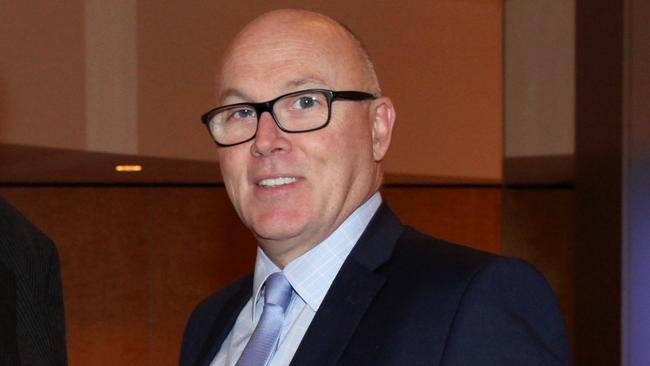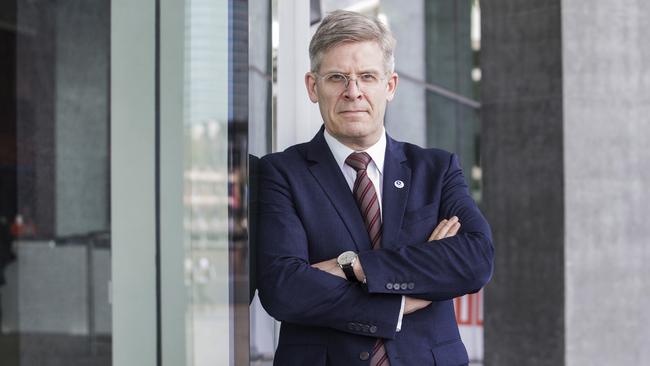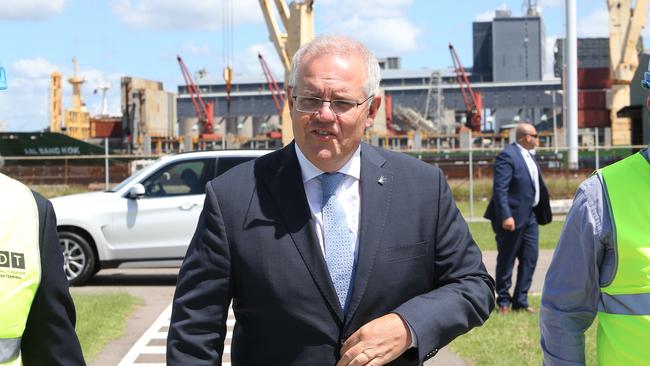Ramsay Health Care’s UK push secures rare insight into Covid crisis


In an interview with The Australian, he confided “it could be better”, which is an understatement, but in his day job he has just catapulted Ramsay to about 25 per cent of the UK private hospital market, putting him behind German giant Fresenius as the second-biggest hospital company in Europe.
McNally has spent 33 years at Ramsay, the last few masterminding its offshore expansion, so he knows the Spire business well.
Spire’s biggest shareholder, South African provider Mediclinic, wanted to concentrate on its domestic market, which opened the door for Ramsay just as the UK press is asking questions about how much it is being paid under the NHS service in the middle of Covid.
This aside, McNally is pushing ahead to take a strong hold of the UK hospital beds, where the private market is about 10 per cent of total beds.
A pandemic may not be the best market for a hospital expansion, but the way McNally sees it, demand is underwritten for the next few years and, with about $50 million in synergy benefits, he is tipping high single-digit earnings-per-share growth.
Ramsay has long been one of Australia’s most internationally diversified companies, with hospitals throughout Asia, Europe and the UK. It has 31,000 staff in Australia and 45,000 now in Europe.
McNally says “this is an asset I have known well for over 10 years”, which gives him the confidence to take advantage of low interest rates and cement his position in the UK and through the European market.
A global firm provides obvious procurement benefits while also being on the forefront of new technology and medical trials.
Parental leave push
Hesta chief executive Debby Blakey thinks the federal government wasted an opportunity in this year’s budget in not supporting superannuation on paid parental leave and opening the scheme to either partner.
The budget contained a step towards better childcare support but failed to take a meaningful push including what some see as the most important change, being making parental leave open to either partner.
This would boost support for women executives and in opening community attitudes.
This said, some progress is being made to the Hesta, Chief Executive Women and ACSI initiative to get the top 200 companies supporting the target of 40 per cent of senior executives as women by 2030.
Ten companies, accounting for 13 per cent of the index, have signed the commitment this week including BHP, ANZ, South32, Ramsay Health Care, SkyCity, Tabcorp, Domino’s, BlueScope, Webjet and IGO.
Blakey said: “Changing our national culture cannot be achieved without courageous leadership. This must involve more women in leadership, as well as men who value the perspective they bring.”
BHP boss Mike Henry, who already has five of his 10 per cent executive leadership as women, said: “Inclusive, diverse teams are safer, more productive and make better decisions. They improve performance.”
Last year 25 new CEOs were appointed, of which one was a woman – AMP’s Alexis George – and only 10 of the top 200 were female with 32.9 per cent of board seats taken by women.
ASX moves
The changing of the guard at the ASX continued on Wednesday with deputy CEO Peter Hiom quitting after 23 years to join Motive Partners.
The US-based consultancy is where former Digital Asset boss Blythe Masters left in 2019, not long after the ASX took a stake in the blockchain advisory firm.
In 2016, ASX paid $14.9 million for a 5 per cent stake in Digital Asset after deciding to use blockchain to replace its CHESS settlement technology.

Hiom, a former Sydney Future Exchange executive, was a key player in the beleaguered blockchain rollout at the ASX, but in October last year long-time ASX executive Tim Hogben was put in charge of the project.
This has seen a significant thawing of relations between the ASX and the industry, but the delays continue with customers waiting to see the final plans on so-called price netting, which were due in mid-April but are now promised at the end of June.
Hogben is considered more consultative than Hiom, who is leaving to follow his interest in business development and new technology.
The CHESS replacement technology was originally due to be in place this year but was delayed until April 2023 to overcome a series of issues both inside and outside the ASX.
The ASX has had a series of technology snafus, which have caused some regulatory concern, but ASIC officially has the issues under investigation.
Former chair Rick Holliday Smith, who was replaced earlier this year by Damian Roche, like Hiom came to the ASX via the SFE.
Newcastle warning
A federal Treasury official warned Josh Frydenberg not to consult the ACCC over decisions involving the declaration of the Port of Newcastle for unnamed legal reasons.
The warning came ahead of the shock budget decision to block merit-based appeals from the National Competition Council, which has long argued against declaring the port, which handles 30 per cent of national coal exports.
Attempts to clarify the “legal” reasons have hit a Treasury brick wall.
The Treasurer has consistently backed the 50 per cent Chinese-owned port in competition decisions over objections from the ACCC.

The port has battled coal exporters since it was sold to China Merchants in 2014 in a $1.8 billion deal by the then Baird NSW government.
The port was sold without any competitive restraints and as soon as ownership changed it instituted massive valuation changes and increases in port charges from 40c a tonne to $1, which makes a difference when the ship carries 100,000 tonnes
The argument on the port side is whatever it charges won’t affect the price of coal or coal mines, which is in dispute particularly now the port is earmarked to be converted to include a container terminal.
The fight against its price hikes and decision to include the $912 million invested by the coal companies in port dredging into its fee determination have been up to the High Court and back ever since, with Glencore on one side backed by the ACCC, which wants the port declared so it can arbitrate on prices.
In a letter on the Treasurer’s website date December 18, 2020, Paul Palisi, director of the Treasury Competition unit, told Frydenberg: “When considering the NCC recommendation, you should not meet with, or consider submissions from, any stakeholders including the Australian Competition & Consumer Commission, as this may render your decision legally vulnerable.”
Just how talking with the government’s competition authority could make the government legally vulnerable is not clear.
It beggars belief that the Treasurer would take key decisions on exports without consulting widely on the issue.
In his role as head of FIRB, Frydenberg has blocked Chinese takeovers of Australian dairy assets but when considering the Chinese-controlled port’s export charges he has backed the port.


Ramsay Health Care boss Craig McNally is set to control Britain’s private hospital market in a $3.7 billion debt-funded acquisition of Spire Healthcare that gives him some insight into how Australia is doing in the Covid vaccination stakes.